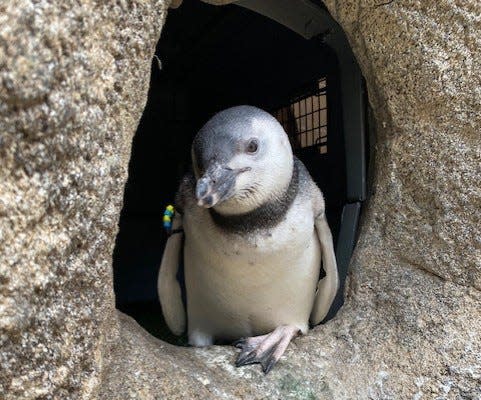Majestic chicks? Actually they're Magellanic penguins hatched at the Jacksonville Zoo

A quartet of Magellanic penguin chicks broke a 13-year-old record when they hatched — one at a time over six days in May — at the Jacksonville Zoo and Gardens.
Their arrival marked the largest number of hatchings in a single season since the opening of the zoo's Tuxedo Coast habitat in 2010. The zoo now has 33 Magellanic penguins, 14 of which have hatched on site.
Breaking the record "is a significant achievement for our zoo and a testament to the expertise and dedication of our animal care team," said Kelly Rouillard, the zoo's director of marketing and sales. "By raising awareness about the challenges penguins face in the wild, we hope to inspire our visitors to take action and support conservation initiatives."
Magellanic penguins hatch: What's the latest birth at the Jacksonville Zoo and the Harry Potter connection?
What's a bongo? Think antelope with stripes. Check out new calf at Jacksonville Zoo
Banks on display: Jacksonville Zoo opens viewing of new jaguar cub
What do we know about the chicks?
Two of the chicks, Bruce and Pietro, are male, and the two others, Wanda and Phoebe, are female. Bruce hatched on May 14, followed by Wanda on May 16, Phoebe on May 17 and Pietro on May 19.
Bruce and Phoebe have first-time parents, Friend and Banner, who broke new ground herself, according to the zoo. Hatched in 2017, Banner is now the first penguin hatched there to become a parent. Wanda and Pietro were hatched to parents Lola and Austin.
How is parenting going?

Some of the new arrivals are being raised by their biological parents, others by foster parents, according to Emily Bridges, the zoo's senior bird care specialist.
"After attempting to keep each set of siblings together in a single nest, our animal care specialists observed that one chick was regularly being outcompeted for food by the other and not gaining weight," she said. "To mitigate any risk and ensure healthy development, we determined foster parenting to be the best approach rather than returning both sets of chicks to their original parents."
Aww, those eyes! First critically endangered mongoose lemur born at the Jacksonville Zoo
Can the public see the chicks?

Visitors to the penguins' home in the zoo, the Tuxedo Coast habitat, may or may not be able to see the chicks, at least for the near future. They spend most of their time swimming and exploring, but they also "have the choice to return to their nest boxes during the day out of public view," according to the zoo.
Magellanic penguin chicks typically remain in their nests with the parents for about 70 days before fledging, when their juvenile layer is replaced by waterproof feathers and they join the penguin colony.
Where do Magellanic penguins come from?
They are native to the coasts of Argentina and Chile and are one of the eight penguin species found in South America and the surrounding islands. There are 18 different species of penguins, 17 of which live exclusively in the Southern Hemisphere, according the zoo.
Among the penguin world, Magellanic penguins are known for their "distinctive black and white plumage and charming waddle," according to the zoo.
Are they endangered?

No. They are listed of "least concern" on the International Union for Conservation of Nature and Natural Resources' threatened species list, with a current population of 2.2 million to 3.2 million. But their numbers are decreasing, according to the union.
Their habitat is threatened by oil spills and other forms of pollution, climate change and overfishing, which depletes their food source, according to the zoo.
Jacksonville Zoo: Beloved 'geriatric' African lion in failing health humanely euthanized
Meanwhile, Magellanic penguins are "considered animal ambassadors and help to raise awareness for other penguin species that are endangered," such as the African penguin, the zoo said.
The zoo supports the Southern African Foundation for the Conservation of Coastal Birds, a nonprofit that works to reverse the decline of seabird populations. The foundation rescues, rehabilitates and releases ill, injured, abandoned and oiled seabirds, especially African penguins, and every year the zoo sends two employees to South Africa for two weeks to help care for the birds.
bcravey@jacksonville.com, (904) 359-4109
JACKSONVILLE ZOO AND GARDENS
The zoo is at 370 Zoo Parkway on the city's Northside. Tickets must be purchased online. For more information call (904) 757-4463, email info@jacksonvillezoo.org or go to jacksonvillezoo.org.
This article originally appeared on Florida Times-Union: Four Magellanic penguin chicks hatched at Jacksonville Zoo in May


